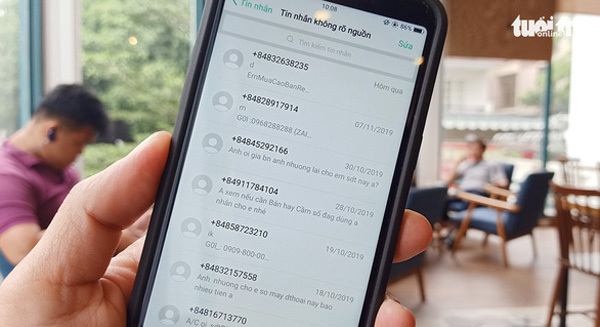 |
| Spam text messages bombard mobile phone users. — Photo tuoitre.vn |
The Ministry of Information and Communications (MIC) recently made public a draft decree on tackling spam text messages, calls and emails, and regulations on advertising.
The draft, which was issued to get the opinions of telecoms businesses and people, is set to come into effect this year.
The draft discusses building and implementing spam prevention systems, monitoring information on sources of spam messages and controlling advertising services.
Spam text message and calls offering land, houses and insurance for sale, as well as collecting debts, have bombarded phone users.
Like many people, Hung, a resident in Hanoi’s Tu Liem District, is often bothered by unexpected calls from telemarketers.
“One day, on a rainy late afternoon, while travelling on crowded and dusty roads from the office to my daughter's school, I got a phone call,” Hung told the newspaper.
“At that time, I thought it might be important call from my boss or a client, so I pulled over and answered the phone.
“But it turned out a call offering me a villa for sale,” he said.
He angrily hung up, but minutes later got another spam phone call offering real estate services to sell his own home.
Although he knew the caller was doing her job, he could not help but shout at her.
Huu Thanh from HCM City’s Binh Thanh District said: “Previously, I got a few calls from insurance companies. But recently, the number of unexpected calls is much greater, especially from automatic switchboards.”
“The calls came from morning until late evening,” Thanh said.
“Recently, I got calls aggressively asking me to repay some loans which I did not borrow,” he said.
In 2016, the MIC set up a hotline to receive reports on spam messages and calls but the move has had little impact.
Telecoms firms MobiFone said that in October alone, it had barred a total 885,000 spam text messages from its 17,800 subscribers, 2.2 million messages from Vinaphone, 275,000 from Viettel and 36,200 from Vietnamobile.
Strict sanctions, network providers’ responsibility
The draft decree mentions solutions to prevent the distribution of spam messages, forcing advertisers to send a copy of each text message purposely sent to targeted customers to a system overseen by the MIC.
Users can also forward spam messages to this system.
The draft also regulates that no organisation, business or individual can contact the phone number of a person or body that has opted out.
Violators can be fined VND80-100 million (US$3,500-4,400).
Under the draft, those making telemarketing calls before 9am and after 10pm could be fined VND20-40 million ($860-1,720) while businesses which charge subscribers for receiving telemarketing calls can be fined VND10-20 million ($430-860).
Businesses that engage in telemarketing without informing the ministry will be fined VND60-80 million ($2,600-3,450).
However, some experts said only fining spam distributors wouldn't solve the problem.
Strict management of subscribers’ information from telecoms network providers was needed to tackle the issue, they said.
“Although telecoms service providers announced efforts to reduce spam messages and calls, they are always beneficiaries regardless of who makes the messages and calls," said Vu Quang Duc, a lawyer in HCM City.
Therefore, telecoms service providers must take responsibility for the situation.
If the distributors of spam messages or calls couldn't be found, the network providers should be penalised, he said.
The large fines in the draft were welcomed by experts.
“For years, this problem which has not been solved thoroughly, made people upset. I think the draft decree provides solutions and mechanisms that could basically solve this issue,” said lawyer Truong Anh Tu.
However, some telecoms businesses said they struggled to block spam messages and calls due to an incomplete legal framework and the lack of a definition of spam messages and calls.
MobiFone’s representative told the newspaper that the draft decree should regulate fines for businesses and individuals who distribute spam messages and calls instead of placing responsibility on telecoms service providers.
“It's because telecoms providers can't define which message and calls are fraudulent or cheating,” he said.
Ngo Vi Dong, vice chairman of Vietnam Information Safety Association, said although the definition of spam messages and calls was not clear, telecoms providers obviously had to take responsibility for the situation.
“If they really want to protect their customers, they have to take many measures to prevent spam messages and calls as well as sanctions to spam distributors,” said Dong.

Vietnam tackles spam messages
All organisations and individuals will have the right to refuse spam calls and messages to their phone numbers if a new draft decree is passed.

IP blacklist to be created to fight spam
The Ministry of Information and Communications might create an IP blacklist, recording IPs that send out spam text messages, calls and emails, officials said.
VNS
 Mobile phone users nationwide have long been plagued with spam text messages and calls, prompting the Government to step in, reported Tuổi Trẻ (Youth) newspaper.
Mobile phone users nationwide have long been plagued with spam text messages and calls, prompting the Government to step in, reported Tuổi Trẻ (Youth) newspaper.